
The noted blogger Fjordman is filing this report via Gates of Vienna.
For a complete Fjordman blogography, see The Fjordman Files. There is also a multi-index listing here.

This post is an amalgam of shorter essays on various topics.
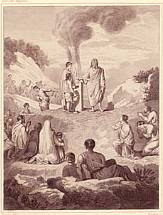 I made a comparison between the reaction of Spartan King Leonidas to the Persian invasion of Greece 2500 years ago and the total lack of reaction against the Muslim invasion of Europe in the 21st century. This does not in any way indicate that I believe the two invasions were identical. The founder of the Persian Empire, Cyrus the Great, was remarkably tolerant for his time. He announced that under his rule, “everyone is free to choose a religion,” and made no attempt to impose Zoroastrianism, which became a popular religion in his empire, on others.
I made a comparison between the reaction of Spartan King Leonidas to the Persian invasion of Greece 2500 years ago and the total lack of reaction against the Muslim invasion of Europe in the 21st century. This does not in any way indicate that I believe the two invasions were identical. The founder of the Persian Empire, Cyrus the Great, was remarkably tolerant for his time. He announced that under his rule, “everyone is free to choose a religion,” and made no attempt to impose Zoroastrianism, which became a popular religion in his empire, on others.
After the Persians conquered Babylon in 539 B.C., Cyrus announced that the Jews were free to return to Jerusalem and rebuild their Temple, which had been destroyed by the Babylonians a few years earlier, thus ending the Babylonian Captivity. Judaism was influenced by Zoroastrian ideas during this Exile. The founder of this religious tradition, Zarathustra, was a fellow monotheist who believed in “one true God.” The depiction of the Devil, among other things, in Christianity later is in some ways similar to ideas found in Zoroastrianism.
The Iranians had a proud history before the advent of Islam. Maybe some day they can follow the example of former Muslims such as Ali Sina and Parvin Darabi and lead the Islamic world away from sharia and Jihad.
The most interesting question isn’t what kind of enemy we are facing, but why Europeans are so weak and feeble in their response. Europe was deeply traumatized by two bloody world wars, fought largely on its soil in the first half of the twentieth century, and has never fully recovered from this. Moreover, Western Europe enjoyed an unprecedented period of peace and prosperity in the second half of the twentieth century thanks to American military protection. The combination of these two periods has created entire generations of who believe that war is always evil, for whatever reason, and are under the illusion that the world has moved “beyond war,” which can soon be banned permanently by international law. Some observers tend to focus exclusively on the destruction wrought during the first of these periods, and tend to forget the challenges created by the artificially safe and peaceful environment upheld by outsiders afterwards.
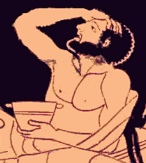 Maybe one of our flaws is a tendency to go from one extreme to the next. Our culture is either superior to that of all others, or it is evil and worthless and should be eradicated. We have created a culture founded on ritualized atonement for past sins, some real and some imaginary, on abasing ourselves in front of others. The only thing we shouldn’t accept is oppression and inequality, which led to all kinds of horrors of slavery, wars and colonialism in the past. There are real evils in our past, and we should not pretend that they didn’t happen. But the West has never been the sole source of atrocities on the planet.
Maybe one of our flaws is a tendency to go from one extreme to the next. Our culture is either superior to that of all others, or it is evil and worthless and should be eradicated. We have created a culture founded on ritualized atonement for past sins, some real and some imaginary, on abasing ourselves in front of others. The only thing we shouldn’t accept is oppression and inequality, which led to all kinds of horrors of slavery, wars and colonialism in the past. There are real evils in our past, and we should not pretend that they didn’t happen. But the West has never been the sole source of atrocities on the planet.
We have developed a strange nanny state culture where risk of any kind is frowned upon. Children are hardly allowed to go to the playground without wearing a full-body armor, yet at the same time we think nothing of allowing the most violent cultures on earth to settle next door. Our total aversion against small-scale risks and dangers in our everyday life makes us incapable of dealing with large-scale threats to our lives and our civilization when they occur. This insidious effect is perhaps the most dangerous aspect of the over-regulated welfare state society. Moreover, the wealth that has been produced in the past by capitalist dynamism has generated a buffer which ensures that it takes time before bad ideas have their full effect. In combination, all these factors have created a bubble of welfare and prosperity where all kinds of unsustainable ideas can thrive.
The historian Bernard Lewis writes — correctly — in his book The Crisis of Islam that the Crusade was a late development that constitutes a radical departure from basic Christian values as expressed in the Gospels. It was of limited duration, whereas Jihad is present from the beginning of Islamic history — in scripture and in the life of the Prophet. However, the same Lewis has some huge blind spots. His ideas about exporting “freedom” to Muslims made significant damage with his support for the pro-democracy drive in Iraq. According to him, “The earliest specifically anti-Semitic statements in the Middle East occurred among the Christian minorities, and can usually be traced back to European originals.”
This is nonsense, as Andrew G. Bostom has clearly demonstrated in his book The Legacy of Islamic Antisemitism. According to Bostom, from the advent of Islam, dehumanizing Jews as apes (Koran 2:65/7:166), or apes and pigs (Koran 5:60) has been common. Muhammad himself referred to the Medinan Jews of the Banu Qurayza as “apes” just before orchestrating the slaughter of all their post-pubertal men. There are quotes in support of anti-Semitism in the hadith, traditions about the Prophet: “The Last Hour would not come unless the Muslims will fight against the Jews and the Muslims would kill them until the Jews would hide themselves behind a stone or a tree and a stone or a tree would say: ‘Muslim, or the servant of Allah, there is a Jew behind me; come and kill him.’”
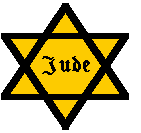 Yes, there is an undeniable and unholy tradition of Christian anti-Semitism, with Jews as “Christ killers.” However, when the Nazis wanted Jews to wear yellow stars and symbols publicly identifying them as Jews, it could be argued that they were in fact copying an Islamic idea. Non-Muslim dhimmis are supposed to wear specific clothes and colors identifying them as belonging to a particular religious groups, as both Jews and Christians did in Islamic Spain and Portugal. That’s one of the Arab influences that is carefully ignored when Multiculturalists talk about how much we owe Muslims.
Yes, there is an undeniable and unholy tradition of Christian anti-Semitism, with Jews as “Christ killers.” However, when the Nazis wanted Jews to wear yellow stars and symbols publicly identifying them as Jews, it could be argued that they were in fact copying an Islamic idea. Non-Muslim dhimmis are supposed to wear specific clothes and colors identifying them as belonging to a particular religious groups, as both Jews and Christians did in Islamic Spain and Portugal. That’s one of the Arab influences that is carefully ignored when Multiculturalists talk about how much we owe Muslims.
I have, on occasion, been critical of my own country’s policies. Am I thus behaving in the same way as Western Multiculturalists, by undermining my own nation’s confidence? I don’t think so. I do not hate my country. It was a good country to grow up in, and I’d like it to remain a safe country to grow up in for my grandchildren. I would, for the most part, describe my own country as naïve rather than evil, although there is something sinister about some of the anti-Israeli and anti-American rhetoric.
– – – – – – – – – –
A man should always be prepared to defend his nation’s freedom and survival, but he shouldn’t be obliged to always defend his nation’s policies if these are unjust and involve sacrificing the freedom and survival of others. A man should criticize his country when it does something wrong, both because this is the right thing to do, but also because, he, by making his country live up to its full potential, will make it easier to defend.
It is true that smaller nations cannot win major ideological wars on their own, but that is no excuse for doing nothing. We should at least hold our ground at home. Israel is also a small nation, yet has held the line against Jihad for decades, and Denmark, the only Scandinavian country with some spine left, has also left its mark.
 Norwegians did not rescue most of our Jews during WW2, as our Danish cousins did. This is a dark spot on our history. Yet we did have an active resistance movement. One of the greatest commando operations during the war was against a heavy water plant in Rjukan in German-occupied Norway, which was sabotaged and destroyed. Nazi Germany had a nuclear program based on heavy water. This may not have been advanced enough to produce nuclear weapons, and the loss of Jewish scientists certainly crippled it, but it was fears of this nuclear weapons that prompted Albert Einstein’s famous letter to President Roosevelt, and thus triggered the initiation of the Manhattan Project which created nuclear weapons in the United States. Ironically, Norwegian heavy water was later used for the production of nuclear weapons in the Jewish state of Israel, the refuge for the survivors of Nazi Germany.
Norwegians did not rescue most of our Jews during WW2, as our Danish cousins did. This is a dark spot on our history. Yet we did have an active resistance movement. One of the greatest commando operations during the war was against a heavy water plant in Rjukan in German-occupied Norway, which was sabotaged and destroyed. Nazi Germany had a nuclear program based on heavy water. This may not have been advanced enough to produce nuclear weapons, and the loss of Jewish scientists certainly crippled it, but it was fears of this nuclear weapons that prompted Albert Einstein’s famous letter to President Roosevelt, and thus triggered the initiation of the Manhattan Project which created nuclear weapons in the United States. Ironically, Norwegian heavy water was later used for the production of nuclear weapons in the Jewish state of Israel, the refuge for the survivors of Nazi Germany.
Norway was also the fourth-largest shipping nation in the world at the outbreak of WW2, behind the United Kingdom, the USA, and Japan, and was of major importance to the allied convoys during the war. A British publication stated that the Norwegian Merchant Fleet was “worth as much to the allied cause as a million soldiers.” Norway is currently the planet’s third largest exporter of oil, after Saudi Arabia and Russia. If the Saudis spend some of their oil money on promoting Jihad and sharia, should not Norwegians then spend a little on combating the same? We could easily create a fund of a billion, or even ten billion US dollars earmarked to defend those whose free speech is threatened for criticizing Islam. And we should do so, both to make an actual difference and to make a clear, moral stand.
I have pointed out that Western welfare states seem to produce huge amounts of bureaucracy. Bureaucracy is of course not a modern invention, nor is it exclusively tied to democratic welfare states. Authoritarian societies, too, can be deeply bureaucratic, both in order to provide artificial employment to large numbers of people and to assert state control in all sectors of society. Perhaps some level of bureaucracy is unavoidable in complex societies with a wide range of professions and a high degree of specialization. But this process definitely has run amok in Western welfare states, and is approaching a critical level.
Quotas and employment based on sex, religion, race or any criteria other than meritocracy, the rule of merit, where individuals are chosen through competition on the basis of demonstrated ability and competence, interfere with private property rights. This violates basic human rights of the employer. Historical experience indicates that respect for private property rights, along with respect for freedom of speech, are the hallmarks of true liberty. Abandoning these principles undermines the free market economy and inhibits the creation of wealth.
Perhaps the new frontier of liberty in the 21st century consists of battling for national sovereignty in legislation, for a nation’s right to decide how much immigration it wants to accept, if any, and the fight against the imposition of quotas, hate speech laws, hate crime legislation and other threats to the individual’s right to free speech and to defense of his own property, the yardstick against which liberty should always be measured.
The UK Commission for Racial Equality in 1996 claimed that “everyone who lives in Britain today is either an immigrant or the descendant of an immigrant.” So, basically, since many population groups in Europe have moved one way or the other since the end of the last Ice Age, none of us have any more claim to our country than, say, Ethiopians? But if that is the case, how come people of European stock in the Americas and Australia are still viewed as alien elements by some, even though many of them have lived there for centuries? As Professor David Conway demonstrates in his book A Nation Of Immigrants?, after the invasion led by William the Conqueror in 1066, the total number of Norman settlers in Britain was never more than five per cent of the population. The inflow now is some 25 times any previous level, and frequently from the opposite side of the planet, not from a neighboring country.
Strangely enough, a British court has decided that use of the word “immigrant” can amount to proof of racial hostility under the 1998 Crime and Disorder Act. A charge of racially aggravated assault had been raised against a woman who referred to a man as “an immigrant doctor.” But if we are all immigrants, calling somebody an “immigrant” cannot possibly be racist, can it? Once again, Political Correctness demonstrates how little is has to do with tolerance, and how much it has to do with making the majority population subject to the whims of minorities at any given moment.
 Dutch Prime Minister Jan Peter Balkenende established a new cabinet in 2007, which included Nebahat Albayrak and Ahmed Aboutaleb, both with dual citizenships. Mrs. Albayrak is Turkish-Dutch and was appointed as the state secretary for justice, thus responsible for immigration policy. Moroccan-Dutch Mr. Aboutaleb is responsible for social affairs and employment. In 2006, Albayrak refused to speak out unequivocally on the Turkish Jihad genocide against the Armenians in 1915, which is forbidden by law to discuss in Turkey.
Dutch Prime Minister Jan Peter Balkenende established a new cabinet in 2007, which included Nebahat Albayrak and Ahmed Aboutaleb, both with dual citizenships. Mrs. Albayrak is Turkish-Dutch and was appointed as the state secretary for justice, thus responsible for immigration policy. Moroccan-Dutch Mr. Aboutaleb is responsible for social affairs and employment. In 2006, Albayrak refused to speak out unequivocally on the Turkish Jihad genocide against the Armenians in 1915, which is forbidden by law to discuss in Turkey.
Freedom Party leader Geert Wilders has proposed that dual nationals should not become members of government and parliament, because their loyalty to one nation could be in doubt. According to Mr. Wilders, not only Turkey and Morocco, but Islam has now penetrated the very core of the Dutch state. Meanwhile, apparently referring to Wilders, Dutch Crown Prince Willem-Alexander worries that debates on dual nationality have a polarizing effect, and states that it is “not for nothing do we have the saying: ‘Speech is silver, silence is golden.’” Prominent liberal VVD member Geert Dales states that “Having two or more passports is entirely unimportant.” Labor Party MP Khadija Arib, who has dual nationality, claims that “I am not loyal to the Netherlands, I am not loyal to Morocco. I am loyal to my principles.”
The intellectual Thomas Kuhn has formulated the theory of paradigm shifts, periodic revolutions in our ways of thinking about the world. I have mixed feelings about Kuhn and don’t like his ideas when applied to science, because I believe there is an anti-rational streak in this concept that has contributed to the rise of Multiculturalism. However, his ideas can sometimes be applicable when describing cultural-ideological changes in society. The Second World War, for instance, contributed to a major paradigm shift in Western ways of thinking about a wide range of issues.
Some readers have claimed that my ideas about totally stopping all forms of Muslim immigration simply aren’t politically possible in the West. Well, it’s impossible according to the current, ruling Multicultural paradigm, yes, but this paradigm isn’t sustainable and is going to break down soon, anyway. Then a new paradigm will emerge, one dedicated to Western survival in the face of Jihad.
 Will China lead the world in the 21st century? Confucius’ collected teachings, The Analects, currently enjoy a major revival in editions tailored to suit a modern audience. Although Confucianism promotes many virtues such as a strong work ethic, it is not prejudice to say that it does contain some authoritarian and anti-individualistic traits. Chinese intellectuals have blamed it for contributing to the some of China’s problems, and for its sometimes overly patriarchal views on women. Will the growth of Christianity in China continue? And if so, will it strengthen a vital component of individualism in Chinese culture?
Will China lead the world in the 21st century? Confucius’ collected teachings, The Analects, currently enjoy a major revival in editions tailored to suit a modern audience. Although Confucianism promotes many virtues such as a strong work ethic, it is not prejudice to say that it does contain some authoritarian and anti-individualistic traits. Chinese intellectuals have blamed it for contributing to the some of China’s problems, and for its sometimes overly patriarchal views on women. Will the growth of Christianity in China continue? And if so, will it strengthen a vital component of individualism in Chinese culture?
President Hu Jintao is preaching a “Harmonious Society” based on Confucian values of unity and respect for authority. When the Communist Party is now promoting a Confucian basis for their rule, which has been the traditional hallmark of rulers in China for centuries, it indicates that the Party has simply become another Chinese dynasty, just like many Russians view Stalin as the Red Czar.
China certainly has the potential to lead the world, but there are stumbling blocks along the way. It does have its challenges, from political corruption to vast environmental problems caused by rapid economic growth. However, if there is one problem China definitely does not have, it is the suicidal streak of self-loathing which is now so prominent in the West. The Chinese do not feel guilty about promoting their own culture or upholding their own borders. In contrast, the United States currently enjoys the greatest military superiority of any power in the history of mankind, and has enough nuclear weapons to blow up much of the planet, yet it is seemingly incapable of protecting its own borders. Although China’s flaws may potentially prevent her from becoming the leading power, the West’s flaws represent a threat to its very survival.
Richard D. Lamm, former governor of Colorado, has drafted a mock plan for a policy of how to destroy the United States, which incidentally looks remarkably like the policies pursued by US authorities today. The plan would include making the US a bilingual country by encouraging the use of Spanish: “History shows, in my opinion, that no nation can survive the tension, conflict and antagonism of two competing languages and cultures. It is a blessing for an individual to be bilingual; it is a curse for a society to be bilingual.”
Lamm would then proceed to encourage immigrants to maintain their own culture, and further establish a grievance industry and a cult of victimology, where all minorities could blame their lack of success on the majority. Finally, he would place all immigration-related subjects off-limits by making it taboo to talk about them. He would find a word similar to “heretic” in the 16th century to brand opponents and paralyze debate. “Racist” will do just fine.
How significant is the election of Nicolas Sarkozy as French president? He is certainly better than the outgoing president, Mr. Chirac, and without doubt better than his Socialist opponent Segolene Royal, who just before the election day threatened French voters that they would unleash “violence and brutality” if Sarkozy won. His opponents immediately staged local riots, and an Islamic terrorist group threatened to launch bloody attacks in response to the election of a “crusader and Zionist” as president.
I believe Mr. Sarkozy is a decent man, and I wish him good luck. I’m just not sure he’s good enough. The French Constitutional Council has approved a law that criminalizes the filming or broadcasting of acts of violence by people other than professional journalists, thus targeting, among others, bloggers. The law was proposed by then Minister of the Interior Nicolas Sarkozy. Besides, even if Mr. Sarkozy is not a bad man, the tasks he is facing are enormous.
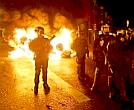 Famed Sociologist Max Weber has defined a state as an entity with a “monopoly on the legitimate use of physical force within a given territory.” Since hundreds of ghettos in France are already outside of police control, and effectively under the rule of local Muslim militias, hasn’t France already ceased being a functioning state? Will France face a civil war, or will the situation just continue as it is today, with gradually increasing gang violence, rapes, street fights and car burnings?
Famed Sociologist Max Weber has defined a state as an entity with a “monopoly on the legitimate use of physical force within a given territory.” Since hundreds of ghettos in France are already outside of police control, and effectively under the rule of local Muslim militias, hasn’t France already ceased being a functioning state? Will France face a civil war, or will the situation just continue as it is today, with gradually increasing gang violence, rapes, street fights and car burnings?
According to the French writer Bernard-Henri Levy, “America is the fire of the European Enlightenment set alight on new shores. Without this idea, it would be nothing more than an amalgam of communities, a juxtaposition of bubbles, the sort of post-modern society some people dream of, but perhaps no longer the American dream.” He may have exaggerated to what extent the United States is a continuation of Europe, but there certainly a connection between the two.
Although some of its seeds may have come from the Middle East, Western civilization is a tree firmly rooted in European soil. The New West, the United States, Canada, Australia and New Zealand, are all branches of this tree. If the worst-case scenario takes place, and the Old West in Europe gets destroyed by Islam, can the New West survive without its roots? Western civilization is, after all, transplanted to North America and Australia, whereas it is native to Europe. Westerners are generally perceived to be the natives of Europe, both by themselves and by outsiders. This is not the case with Westerners in the New West. This distinction has not been very significant so far, but it could theoretically turn out to be so later.
Some observers have suggested that the European Unions is using Bismarck’s unification of Germany as a model for European integration. The numerous German states rallied to Prussia’s side against the French in the Franco-Prussian War in 1870, thus paving the way for a new, powerful German federation. The EU is trying to cast the United States in the role as the external rival. However, this comparison contains some large flaws. Elements of German nationalism existed at least as far back as the Protestant Reformation in the early 16th century.
 According to The Story of Christianity: Volume Two, by Justo L. Gonzalez: “…much of Luther’s impact was due to circumstances that he neither created nor controlled, and of whose role in the process of reformation he himself was only dimly aware. The invention of the movable type printing press gave his writings a widespread audience they otherwise would not have had – in fact, Luther was the first to make full use of the value of printing as a medium for propaganda, and to write with the printed page in mind. The growing German nationalist sentiment of which he himself partook offered unexpected but very valuable support.”
According to The Story of Christianity: Volume Two, by Justo L. Gonzalez: “…much of Luther’s impact was due to circumstances that he neither created nor controlled, and of whose role in the process of reformation he himself was only dimly aware. The invention of the movable type printing press gave his writings a widespread audience they otherwise would not have had – in fact, Luther was the first to make full use of the value of printing as a medium for propaganda, and to write with the printed page in mind. The growing German nationalist sentiment of which he himself partook offered unexpected but very valuable support.”
Martin Luther helped strengthen this German national sentiment further by printing Bibles in the vernacular, thus shaping the modern German language. Notice that there was some German proto-nationalism present centuries before the formal unification of Germany. Bismarck’s German states were already united by a common language. This is not at all the case with the EU today.
It says in the proposed EU Constitution that the European Union is based on “democracy.” Yet the European Commission, the EU’s government, is both the executive and the legislative branch of the EU, and happens to be unelected and totally unaccountable to anybody. Clearly, the EU has never heard about Montesquieu or the concept of separation of powers. The elected European Parliament, the EU’s democratic fig leaf, is largely a joke, and the national parliaments are gradually reduced to rubber-stamping federal EU legislation. This is called “democracy,” which means that the word had become so vague that we should perhaps use it with some caution.
At the EU Observer, Anthony Coughlan, a senior lecturer at Trinity College in Dublin, Ireland, notes that in every EU member state at present the majority of laws come from Brussels. Why do national politicians and representatives accept this situation? He suggests a plausible explanation:
“At national level when a minister wants to get something done, he or she must have the backing of the prime minister, must have the agreement of the minister for finance if it means spending money, and above all must have majority support in the national parliament, and implicitly amongst voters in the country. Shift the policy area in question to the supranational level of Brussels however, where laws are made primarily by the 27-member Council of Ministers, and the minister in question becomes a member of an oligarchy, a committee of lawmakers, the most powerful in history, making laws for 500 million Europeans, and irremovable as a group regardless of what it does. National parliaments and citizens lose power with every EU treaty, for they no longer have the final say in the policy areas concerned. Individual ministers on the other hand obtain an intoxicating increase in personal power, as they are transformed from members of the executive arm of government at national level, subordinate to a national legislature, into EU-wide legislators at the supranational.”
EU ministers see themselves as political architects of a superpower in the making. By participating in the EU, they can also free themselves from scrutiny of their actions by elected national parliaments.
According to Coughlan, “the great bulk of European laws are never debated at council of minister level, but are formally rubber-stamped if agreement has been reached further down amongst the civil servants on the 300 council sub-committees or the 3,000 or so committees that are attached to the commission.”
EU integration represents “a gradual coup by government executives against legislatures, and by politicians against the citizens who elect them.” This process is now sucking the reality of power from “traditional government institutions, while leaving these still formally intact. They still keep their old names — parliament, government, supreme court — so that their citizens do not get too alarmed, but their classical functions have been transformed.”
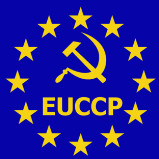 This is perhaps the most dangerous aspect of the EU: It is increasingly dictatorial, but it is a stealth dictatorship, whose most dangerous elements are largely invisible in everyday life, and that’s why it works. What the average persons sees is that the EU makes it easier for him to travel to other European countries without a passport, and use the same Euro currency from Lapland in Finland to Spain’s Canary Islands outside the African coast.
This is perhaps the most dangerous aspect of the EU: It is increasingly dictatorial, but it is a stealth dictatorship, whose most dangerous elements are largely invisible in everyday life, and that’s why it works. What the average persons sees is that the EU makes it easier for him to travel to other European countries without a passport, and use the same Euro currency from Lapland in Finland to Spain’s Canary Islands outside the African coast.
This appears convenient, and it is. But it comes with the price of hollowing out the power of elected institutions and placing it into the hands of a powerful, unelected oligarchy who are conspiring to usurp ever-more power and rearranging the entire continent without popular consent. That’s a steep price to pay for a common currency. But people do not clearly see this is their daily lives, and seeing is believing. The enemy that clearly identifies himself as such is less dangerous than the enemy who is diffused and vague and difficult see, since you cannot easily mobilize against him.
European elites created the European Union in a last-ditch effort to remain relevant on the world stage. Instead, they may have signed the continent’s death warrant by weakening its cultural defenses and handing it over to Muslims. Without the EU, Europe would probably have diminished in power in global affairs, but it would still have remained recognizable as “Europe.” Now, the continent not only risks becoming irrelevant, it risks becoming destroyed forever, with the active aid of the EU.

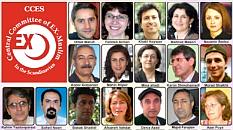 The Central Council of Ex-Muslims in Germany is pleased to note, “that in so short a time Islam-critical and -damaged immigrants from Arab countries, whose example those from Turkey and Iran now also follow, organize publicly in other parts of the world.” The executive committee of the German ZdE [Zentralrats der Ex-Muslime, the Central Council of Ex-Muslims] regards this development as an encouraging indication of the development of an international Islam-critical reform movement.
The Central Council of Ex-Muslims in Germany is pleased to note, “that in so short a time Islam-critical and -damaged immigrants from Arab countries, whose example those from Turkey and Iran now also follow, organize publicly in other parts of the world.” The executive committee of the German ZdE [Zentralrats der Ex-Muslime, the Central Council of Ex-Muslims] regards this development as an encouraging indication of the development of an international Islam-critical reform movement. What is Multiculturalism? There is probably a new Great Idea for every generation. It changes just enough for people to be duped again, but it always entails some form of large-scale change for millions of people. The less it corresponds to reality, the better. The point is to outbid others in Utopian ideas. What is behind it? Well, the joy of destroying the Established Order to bring purpose into otherwise purposeless lives and the desire to immerse oneself into grandiose ideas. The desire for personal power and the joy of being able to harass opponents shouldn’t be underestimated, either. If you claim that your Utopian ideas are about justice and equality, you can also claim that those who disagree with you are proponents of injustice and inequality, in other words evil, and outside the boundaries of civilized debate.
What is Multiculturalism? There is probably a new Great Idea for every generation. It changes just enough for people to be duped again, but it always entails some form of large-scale change for millions of people. The less it corresponds to reality, the better. The point is to outbid others in Utopian ideas. What is behind it? Well, the joy of destroying the Established Order to bring purpose into otherwise purposeless lives and the desire to immerse oneself into grandiose ideas. The desire for personal power and the joy of being able to harass opponents shouldn’t be underestimated, either. If you claim that your Utopian ideas are about justice and equality, you can also claim that those who disagree with you are proponents of injustice and inequality, in other words evil, and outside the boundaries of civilized debate.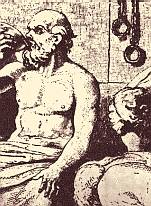 One person in democratic Athens who did face a trial, however, was Socrates, whom the oracle at Delphi had supposedly claimed was the wisest man alive. He was found guilty of corrupting the youth and drank the poisonous hemlock. The trial made a lasting impression on his disciple Plato, who concluded that a political system where a great man such as Socrates, who challenged people to think for themselves, could be sentenced for speaking his mind was an unjust system.
One person in democratic Athens who did face a trial, however, was Socrates, whom the oracle at Delphi had supposedly claimed was the wisest man alive. He was found guilty of corrupting the youth and drank the poisonous hemlock. The trial made a lasting impression on his disciple Plato, who concluded that a political system where a great man such as Socrates, who challenged people to think for themselves, could be sentenced for speaking his mind was an unjust system.
 Alexis de Tocqueville, the French author of the classic book
Alexis de Tocqueville, the French author of the classic book 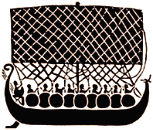 I have debated the issue of Vikings vs. Muslims with some Scandinavians. Some have claimed that they were the Al-Qaida of medieval Europe. But Vikings valued truth and keeping their word to maintain their honor, instead of saving face. They had blood feuds, kept slaves and raided the Christians of Europe. Yet even though the Vikings could be brutal (“Thou shalt not kill” is a Christian concept), they still had an honor codex that was tied to acts of courage.
I have debated the issue of Vikings vs. Muslims with some Scandinavians. Some have claimed that they were the Al-Qaida of medieval Europe. But Vikings valued truth and keeping their word to maintain their honor, instead of saving face. They had blood feuds, kept slaves and raided the Christians of Europe. Yet even though the Vikings could be brutal (“Thou shalt not kill” is a Christian concept), they still had an honor codex that was tied to acts of courage. In the early 16th century, writers such as
In the early 16th century, writers such as 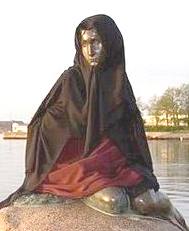 Police don’t know who clad the Little Mermaid during the night in a veil and long robe, but she has her clothes off again.
Police don’t know who clad the Little Mermaid during the night in a veil and long robe, but she has her clothes off again.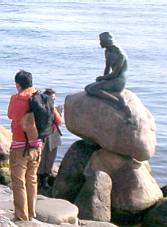 Imagine moving the Eiffel Tower a few metres further to the left, or the Statue of Liberty just a little closer to Manhattan. The City of Copenhagen is considering something similar for its own landmark — the Little Mermaid Statue.
Imagine moving the Eiffel Tower a few metres further to the left, or the Statue of Liberty just a little closer to Manhattan. The City of Copenhagen is considering something similar for its own landmark — the Little Mermaid Statue. I wrote a
I wrote a  Ayaan Hirsi Ali is a remarkable person. Her autobiography,
Ayaan Hirsi Ali is a remarkable person. Her autobiography,